Each month, we will present an article in the “Path To The Throne” series, a set of stories that tells how the LA Kings became the LA Kings. Starting off with Head Coach Jim Hiller, who spent several years working to reach his current position, as he’s primed to coach his first Opening Night as an NHL Head Coach on Thursday in Buffalo.
Sometimes the greatest indicator of how the subject of a story is truly regarded is how people respond when you ask them to share their thoughts on that person.
Take Los Angeles Kings head coach Jim Hiller, for example.
In some ways Hiller represents a clean slate in the world of NHL head coaches where often the names stay the same even if this cities in which they coach change. In a matter of days Hiller will be set to coach his first season-opening game as an NHL head coach having taken over for Todd McLellan midway through last season.
So, who is Hiller?
Well, he’s a father of three whose favorite movie is Good Will Hunting.
He makes Anze Kopitar and other players on the team laugh.
And he’s not about to go changing, no matter how long it’s taken to become a National Hockey League head coach.
But what are the ingredients that have led him to this point? What ingredients led LA Kings management to push their chips into the middle of the table this offseason and say, ‘Jim Hiller is our guy’?
Dan Price has some of those answers. In fact he is anxious to share them.
When Price calls to talk about his good friend and mentor, he is wearing his skates and getting ready to take the ice for a Chicago Wolves practice in suburban Chicago where he has a new gig as an assistant coach for the American Hockey League team.
“I can say this, Jim has been and continues to be one of the great mentors in my life both professionally on the hockey side but also just as a person as well,” said Price, who began his major junior hockey coaching career with Hiller in Chilliwack almost 20 years ago. “He just has a real genuine and sincere empathy towards people he interacts with and he has the great ability to balance, like as any great coach and great leader does, that great ability to balance how and when to push people around him to get the most out of them and also how to support them so they always know that it’s coming from a place of the fact that he cares about people and wants the best for them.”
Later, Price sends a detailed note adding context to his thoughts on Hiller including a long reference to Good Will Hunting.
Andrew Brewer worked as an assistant coach with Hiller in Detroit and Toronto. He is getting ready to ride out Hurricane Helene in Tampa when he answers the phone to talk about Hiller.
No worries – He and his family are high and dry and he, like Price, was anxious to talk about Hiller and why the time he’s spent with him was meaningful, not to mention why Brewer thinks he’s going to be a good fit with the LA Kings.
“He’s kind of the perfect coach for the era,” Brewer said.
He pointed to the close relationships Hiller built with high skill players like Pavel Datsyuk in Detroit and Auston Matthews in Toronto. He is comfortable with synthesizing data and assessing the analytic side of the game and has a keen understanding of the many nuances of the on-ice game.
“He’s such a well-rounded human being,” Brewer said. “It’s not ever one-dimensional. You never know what the conversation may include. He’s a unique blend of skill that a lot of times you don’t see.”
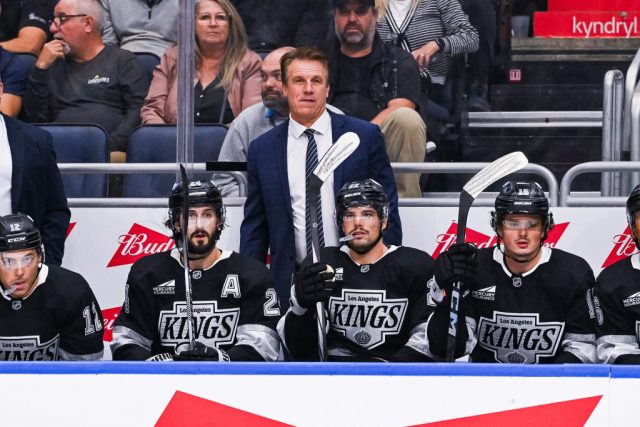
Photo by David Kirouac/NHLI via Getty Images
Hiller, 55, is from British Columbia and, as fate would have it, was selected 207th overall by the LA Kings in 1989. He attended Northern Michigan University and in 1991 was part of a team that won a national championship.
It was in this moment that Hiller knew he wanted to be a coach.
“We were not expected to win anything, but we just found a way,” Hiller said during a conversation before the Kings were scheduled to open the 2024-25 National Hockey League season in Buffalo. “The coaches brought us together, we had a good time, everything just worked and I was like, that’s a pretty cool, maybe I could do that, lead some players and try to inspire them and get them to accomplish something great like we did. So from that point on I had it in my mind.”
Hiller began taking notes on his observations on how coaches handled certain scenarios.
He spoke to players about their thoughts on coaches and coaching.
What worked? What didn’t? Why?
The voluminous collection is still on his computer.
One of the most important moments in his information gathering on coaching and hockey came while he was an assistant coach in Toronto with the Maple Leafs and then GM Lou Lamoriello brought in Hall of Famer Jacques Lemaire as a consultant.
Hiller and the notoriously quiet Lemaire developed a bond and at one point Hiller asked if Lemaire would be willing to sit down and share his thoughts on coaching.
“And I interviewed him almost like we’re doing right here,” Hiller said. “Okay Jacques, tell me about interviewing with a general manager. What are your thoughts on that? Tell me about training camp. Tell me about preseason. Okay, you’ve got your team together, what’s your first meeting? So I went through the whole thing. It’s fascinating.”
Hiller met his wife, Kathy, when both were at Northern Michigan University.
Their journey has taken them hither and yon and back again. From playing to coaching Hiller figures they never spent more than three years in any one place during the first 18 years or so of their hockey relationship.
Hiller, who played 63 NHL games and ended up his playing career in Germany and Italy, chuckles when recalling an early conversation he and Kathy had about the coaching life.
“We’ve moved a lot, so I said I want to start coaching and she was completely supportive, [always] has been,” Hiller said. “She said ‘well okay what’s this going to look like?’ I said give me five years. Five years I think I can make my way up into the NHL in some type of position.”
He and Kathy began the coaching part of their hockey odyssey together in 2002-03 when Hiller took an assistant coaching job with the Tri-City Americans of the Western Hockey League.
Ten years later Hiller was back in Tri-City, this time as the team’s head coach.
Then he got fired.
“So, it was 10 years later, we’re still in the Western League, but I had no job. So it didn’t quite go according to plan,” he said with a laugh.
A month later Mike Babcock hired Hiller to join his staff in Detroit.
Funny how things work out, no?
At one point fairly early in the process a coaching job had come up at Northern Michigan, his alma mater which is also located in Kathy’s hometown of Marquette, Michigan.
It was a good job. Lots more stability than trying to climb the junior ranks so Hiller asked Kathy, who had three small children to consider at that point, what she thought about him applying for the job.
“I give her credit. She says, are you crazy? I’ve already invested this much time. You said that you were going to do this and you’re thinking that maybe we should go there?”
She knew Hiller wouldn’t be happy. So the moment passed, the journey continued.
Here’s another moment.
During his first stint with the Tri-City Americans Hiller attended the NHL draft with owners and management. It was first time at the event and he was sitting up in the stands with one of the other owners looking at the team tables all arranged on the draft floor.
“I’ll never forget this, he said to me, ‘what are you thinking when you sit here and see this, the draft, just some small talk,” Hiller recalled. “And it was so clear to me, I said, ‘you know what I think? I need to be right down there.’ It was just like it hit me in that moment that it became more focused or more clear what the goal was going to be. I need to be down there.”
So much of this coaching job is beneath the surface, iceberg-like.
The moments sequestered in a windowless room going over video and line combinations after a tough loss or preparing for a crucial playoff game, those are the telling moments.
Brewer, who works in technology related to the game and is a consultant for various teams and organizations, calls his time working with Hiller and D.J. Smith, “the best he’s ever had in hockey.”
He was ecstatic for Hiller and for Smith, whom Hiller brought onto his staff and with whom Brewer worked in both Detroit and Toronto.
“You’re just so happy, you never know, so many guys don’t get the opportunity,” Brewer said. “I was so jacked for him and I was happy for D.J. [because] they’re both great human beings.”
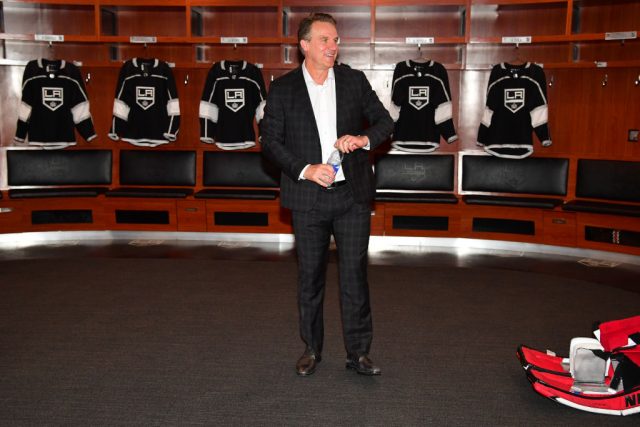
Photo by Gary A. Vasquez/NHLI via Getty Images
Barry Trotz hired Hiller when Trotz took over as head coach of the New York Islanders after winning a Stanley Cup in Washington and led the Isles to back-to-back Eastern Conference Final appearances in 2020 and 2021.
Trotz was impressed with Hiller’s hockey smarts and how he was able to embrace trends in an ever-changing game. But it was more of the intangibles that appealed to Trotz the veteran coach and now GM of the Nashville Predators said during a conversation at the start of last spring’s playoffs.
Hiller’s ability to communicate with players and coaches, his upbeat personality, made him a valuable part of the Isles coaching staff and by extension a valuable part of the Isles successes.
“I thought he was in touch with the growth of the game, with younger players,” Trotz said.
Hiller was never afraid to speak up and offer his opinion as well.
“He was always good at that,” Trotz said. “He was a really good fit. I think he’s got a really good handle on a team and he’s not afraid to make the strong decisions when he has to either.”
Why did it take so long for Hiller to get a chance to be a head coach?
Why is the sky blue and a puck black?
“You need people believing and trusting your skill set,” Trotz said. “I think Jim has all the skill sets.”
Here’s a snapshot.
Price had left his job as a commercial and civil lawyer in order to pursue a full-time career as a coach.
He got to know former NHLer Brad Werenka who was going to law school in Calgary. Werenka had played with Hiller at Northern Michigan and when Hiller got his first head coaching gig in the Western Hockey League with expansion Chilliwack he called Werenka.
Werenka was going to law school and declined but recommended Price.
The two became fast friends.
Price recalled being on Hiller’s staff when he became the head coach in Tri-City in 2009. The team had been a power in the WHL and lost a number of veteran players.
Hiller gathered the leadership group before the season began.
“In this very conversational way Jim just sort of laid it out for the captains and said, ‘Look it, this is one of those years where everyone’s going to feel like we’re vulnerable and they’re going to say, finally, finally, after several years Tri-City is going to fall off and we’ll be able to take points off of these guys,” Price said. “I don’t know how you guys feel about it, but I would just kind of prefer to see you not let that happen and basically prove everyone wrong. What do you guys think about that?”
Price said the response was almost magical.
“Just the way he put that in their hands you could just instantly feel the vibration and the energy and in the room change,” Price said. “And they did it. It’s that kind of empowerment that he gives people that really makes him such a great coach and a great friend as well.”
Does that sound familiar? It should.
A few days ago Hiller was talking about top prospect Alex Turcotte.
He was describing how Turcotte’s role to start the season will be to center the team’s fourth line. He explained how he didn’t tell Turcotte what to do necessarily but rather had a conversation with him that allowed Turcotte to come up with his owner answers about how best to fulfill this role.
It’s a small thing, maybe, but the devil is in the details in this game.
Help the players find the questions and then, hopefully, the answers as opposed to ramming your idea of the game down players’ throats, or down the throats of your staff.
That seems like a solid coaching philosophy. Yet many coaches choose the different path where their way is the only way.
Maybe they don’t want to seem vulnerable.
But what if you don’t have all the answers?
Hiller certainly doesn’t have all the answers. So maybe his staff or the players or someone else does.
“He’s not afraid of change. If there’s a better way to do it, we’re going to do it,” Smith said.
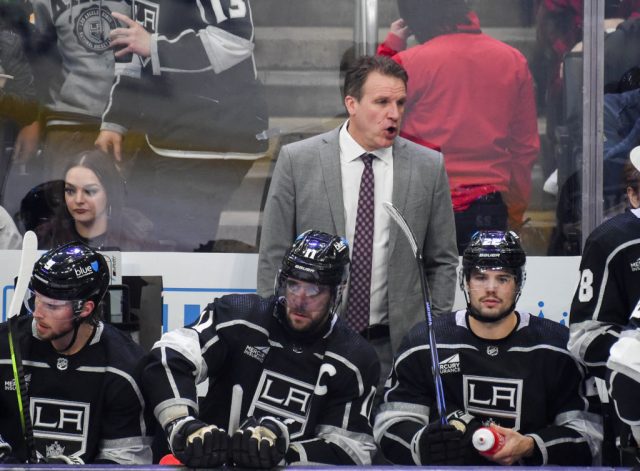
Photo by Juan Ocampo/NHLI via Getty Images
There is something perfectly simpatico about how Hiller and Smith work together, how they work the practices, how they patrol the Kings bench. They have shared many highs, maybe an equal number of lows.
When Smith got a chance to rejoin Hiller last season he jumped at it just as he jumped at the chance to come back this season to work with his old friend.
“He’s a guy that thinks outside the box. He’s not doing things the simple way,” Smith said. “He’s always trying to find better ways to play the game or be ahead of the curve. He’s always been that way.”
Hiller’s wife, Kathy, sometimes jokes that Hiller is just amusing himself when he throws out regular pop culture references, references to authors or themes of books, lines from songs or anecdotes about artists.
“For me it’s worked. I think it’s worked. So I’ll just be who I am. I like to talk to the guys. I like to engage with them,” Hiller said.
He chuckles when he thinks about LA Kings captain Anze Kopitar and how Kopitar always seems to get a kick out of Hiller. Laughing, whether with or at him, is still laughter, Hiller points out.
Whatever it is, on the eve of this season, there is a different feel around this Kings team.
The practices have been vigorous, competitive, up-tempo.
No games have been contested with points on the line, so what that means is debatable. But it’s still real.
“There’s a spirit,” Hiller said. “Every team you’ve been around has a spirit and it can be the same type of players from year to year but somehow it has to feel bigger or better or more important and I think that’s the coaches’ most important job is to try to create that somehow.”
You might imagine that with the season-opener looming on Thursday, the first time that Hiller will stand behind the bench of a National Hockey League team, his team, to start a season, that he’d feel some sense of importance, a sense of the moment, maybe a sense of destiny even.
Nope.
“Maybe I should feel like that but I don’t feel that way. I only feel just really excited for the summer that we had, the chance to hire Newell, (new assistant coach Newell Brown), get the coaches together, talking about the game, looking at the game,” Hiller said.
Thursday is just another day on the road to implementing the plan. Then it will be on to Boston for Game 2 of 82 and so on.
“The role changes. You have to address the role differently, but not the person,” Hiller said of becoming a head coach. “I would say if it’s changed me that’s not a good thing. That’s a bad thing. I hope people would tell me. I don’t think I’m any different as the head coach. Outside of my responsibilities changed, but my approach, the communication, what I thought was important, they all stayed the same and I’m not here to big-league anybody. Those guys know that it’s just the way it is and the way it’s going to be.”
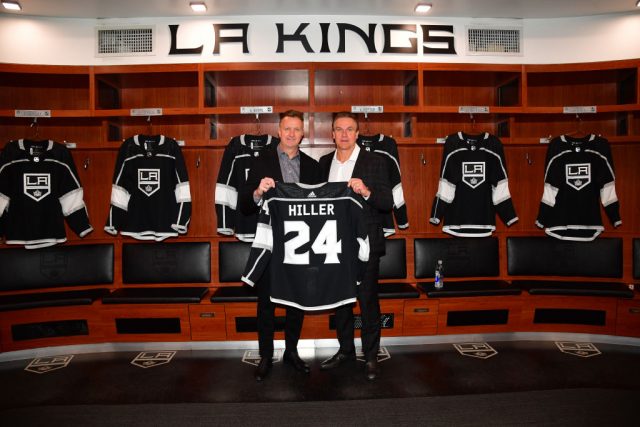
Photo by Gary A. Vasquez/NHLI via Getty Images

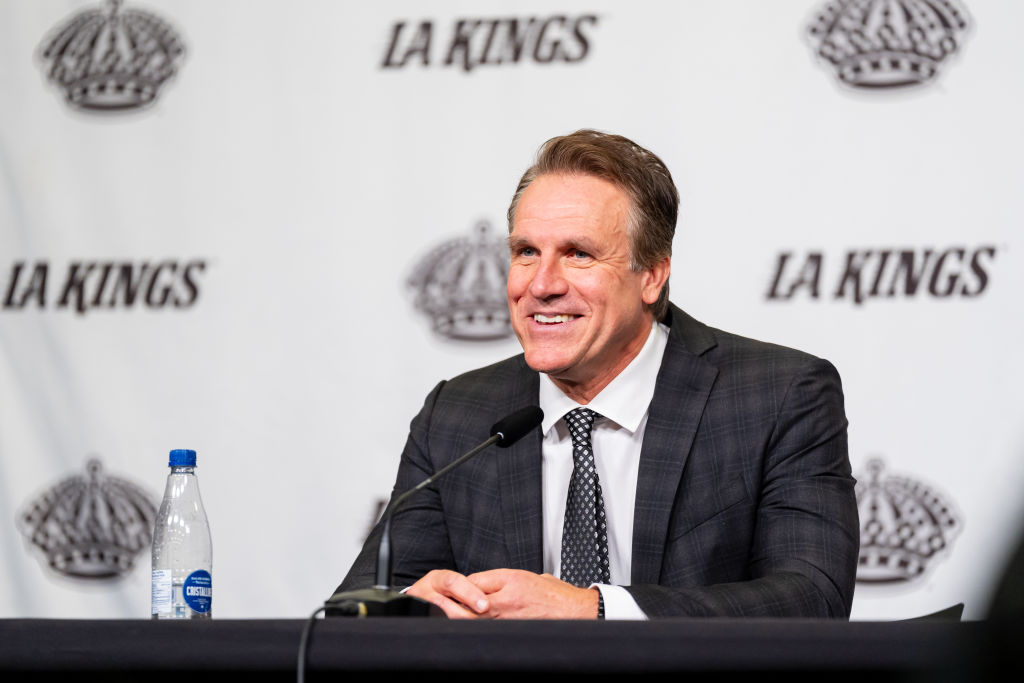
Rules for Blog Commenting
Repeated violations of the blog rules will result in site bans, commensurate with the nature and number of offenses.
Please flag any comments that violate the site rules for moderation. For immediate problems regarding problematic posts, please email zdooley@lakings.com.